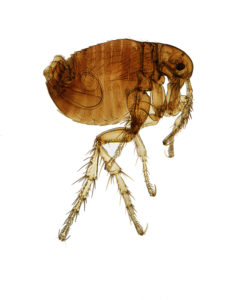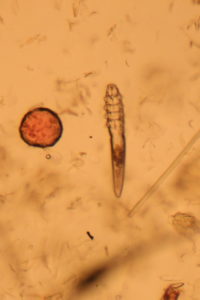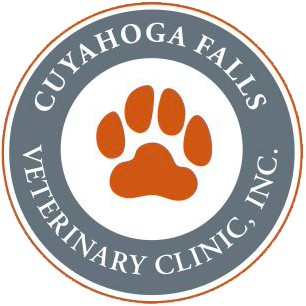Let’s just say it up front: parasites are gross!
Webster defines “parasite” as “an organism living in, with, or on another organism in parasitism.” In veterinary medicine there are lots of parasites that deserve our attention. Some of them only make our pets sick while others can can make both our pets and us sick!
We’ll break down parasites into two categories: external parasites and internal parasites.
The two most common external parasites that come to mind are fleas and ticks. We’re seeing lots of fleas right now. Dogs and cats acquire fleas by passing through an area where another animal with fleas has been. Adult fleas rarely jump from one animal to another (they’re happy to stay with their meal!), but the eggs that a female sheds will fall off of the animal into the environment, the eggs will mature through the life stages and then become an adult flea that will look for a blood meal. If your cat is the first animal that comes by, then your cat is unlucky. The flea will jump on and begin feeding.
Female fleas will start shedding eggs shortly after taking a blood meal. 
They shed around 30 eggs per day, and depending on the conditions, the eggs will become adults in somewhere between 2 and 8 weeks. You can see how one flea can turn into millions in short order!
Ticks will often climb up to the tops of grass or weeds and wait for a host, such as you our your dog, to come by. They then climb onto and then attach to their host, take a blood meal, and then get ready to reproduce. They can carry a variety of diseases, such as Lyme, Ehrlichia and Anaplasmosis. While these diseases are not yet a big problem in our area, the time will come when they are big problems, as ticks are migrating towards and emerging in northeast Ohio.
Both fleas and ticks are absolutely treatable. There are some unsafe products for controlling these problem parasites, and there are some very safe and effective products. If you see even one flea or one tick, give us a call and we’ll talk about what to do about your pet, and your house.
Other external parasites that we see in dogs and cats are various types of Lice (some of which can look like dandruff), Sarcoptic Mange and Demodectic Mange. Mange mites are microscopic and live within the skin.
Internal parasites that we see more commonly with small animals are Heartworms and Intestinal Parasites, such as Roundworms, Hookworms, Whipworms, Giardia and Coccidia.
Heartworms are spread from dog to dog (or cat) by mosquito, they are life-threatening in cats, and will lead to certain death if not treated in dogs. Even treatment is not an easy, guaranteed process.
Roundworms and Hookworms are commonly found in puppies and kittens, and these can be shared with people. Whipworms can be found in dogs of any age, and also bother humans. Dogs and cats pick up these parasites from their mothers before birth and/or by putting the wrong “thing” in their mouth outside, i.e. fecal-oral transmission. (Don’t spend too long thinking about that… and especially don’t think too long about the fact that the mouth that eats the garbage outside is the same mouth that they use to lick our faces!)
We’ve got to make sure our dogs and cats are free of intestinal parasites because they can share some of them with us. “Zoonosis” or “Zoonotic” are the terms for a disease that can be shared between animals and humans. Rabies is a zoonotic disease. Ringworm is a zoonotic disease. And with regard to our subject here, roundworms, hookworms and whipworms are zoonotic: dogs and cats can share them with us!
The best protection for us? Practice good hygiene and maintain your pet(s) on monthly heartworm preventive. Heartworm preventive catches these zoonotic intestinal parasites and limits human exposure by treating dogs and cats. Monthly heartworm preventive is good public health!
So be healthy and be proactive when it comes to preventing parasites!
—————–
Update, 7/5/2013
Ticks are here in northeast Ohio in a big way. They used to be limited to the tall grass, but we’ve been finding them in yards and baseball fields in the area. Whole parasite prevention and control is needed for our pets, especially our outdoor pets.


Tweets that mention http://blog.fallsvetclinic.com/?p=112utm_sourcepingback -- Topsy.com
[…] This post was mentioned on Twitter by . said: […]
The Cuyahoga Falls Veterinary Clinic | Animal Wellness | Medical Services | Pet Services
[…] Fleas, Worms, Ticks and other Parasites […]
The Cuyahoga Falls Veterinary Clinic | Animal Wellness | Medical Services | Pet Services
[…] while back, in our blog post titled Fleas, Works, Ticks and other Parasites, we talked about the more common parasites that can affect our pet friends. At the end of the post […]
The Cuyahoga Falls Veterinary Clinic | Animal Wellness | Medical Services | Pet Services
[…] make sure to clean up after your dog. Not only is dog stool just gross to step in on the trail, but intestinal parasites are passed from dog to dog fecal-orally. We can cut down on exposure of these these parasites to […]
The Cuyahoga Falls Veterinary Clinic | Animal Wellness | Medical Services | Pet Services
[…] heartworm preventive treatments also protect pets against many (if not all) of the intestinal parasites they may encounter. Some even incorporate flea and/or tick protection. When we consider that pets […]
The Cuyahoga Falls Veterinary Clinic | Animal Wellness | Medical Services | Pet Services
[…] disease in the world. Zoonotic diseases are those that animals and people can share (think Rabies, intestinal parasites or ringworm). Keeping our dogs protected is good public health! There are many reasons to be […]
The Cuyahoga Falls Veterinary Clinic | Animal Wellness | Medical Services | Pet Services
[…] the parasite front, plan on purchasing monthly heartworm preventive at the outset. Pharmaceutical companies will often […]
The Cuyahoga Falls Veterinary Clinic | Animal Wellness | Medical Services | Pet Services
[…] crazy things. They don’t often care what the crazy things taste like (consider the fact that some dogs eat poop… that can’t taste good!), some of our pets just get a bug in their mind to swallow […]
The Cuyahoga Falls Veterinary Clinic | Animal Wellness | Medical Services | Pet Services
[…] of the lifestyle of dogs and cats, it is not unusual for them to encounter intestinal parasites. Many simply refer to intestinal parasites as “worms.” Some parasites cause minor […]
The Cuyahoga Falls Veterinary Clinic | Animal Wellness | Medical Services | Pet Services
[…] samples of dogs and cats as we screen them for intestinal parasites. We’e talked about the importance of keeping our pets parasite-free both for their protection and for ours. Looking for microscopic parasite eggs helps us identify the […]